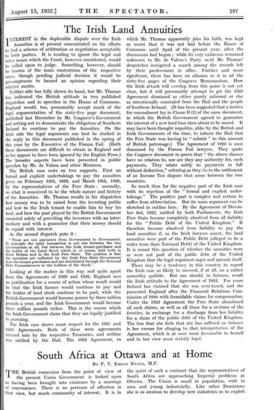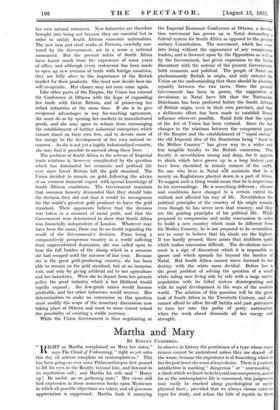South Africa at Ottawa and at Home
By P. V. EMEYS EVANS, M.P.
THE British connexion froin the point of view of the present Union Government is looked upon as having been brought into existence by a marriage of convenience. There is no pretence of affection in that view, but much community of interest. It is in the spirit of such a contract that the representatives of South Africa are approaching Imperial problems at Ottawa. The Union is small in population, wide in area and young industrially. Like other Dominions she is as anxious to develop new industries as to exploit her own natural resources. New industries are therefore brought into being not because they are essential but in order to satisfy South African economic nationalism. The new iron and steel works at Pretoria, carefully nur- tured by the Government, are in a sense a national monument. But the present rulers of South Africa have learnt much from the experience of some years of office, and although every endeavour has been made to open up new avenues of trade with foreign countries, they are fully alive to the importance of the British market for their products. She must now decide how she will co-operate. Her chance may not soon come again.
Like other parts of the Empire, the Union has entered the Conference at Ottawa with the hope of expanding her trade with Great Britain, and of preserving her infant industries at the same time. If she is to give reciprocal advantages in any far-reaching agreement, she must do so by opening her markets to manufactured goods, and she may agree to refrain from encouraging the establishment of further industrial enterprises which cannot stand on their own feet, and to devote more of her energy to the development of her own natural re- sources. As she is not yet a highly industrialized country, she may find it possible to succeed along these lines.
The problem of South Africa in the scheme of Imperial trade relations is, however, complicated by the question which has dominated her economic and political life ever since Great Britain left the gold standard. The Union decided to remain on gold, following the advice of an eminent financial expert with special knowledge of South African conditions. The Government maintain that common honesty demanded that they should take the decision they did and that it would be incongruous for the world's greatest gold producer to leave the gold standard. Their opponents believe that the decision was taken in a moment of racial pride, and that the Government were determined to show that South Africa was financially independent of London. Whatever may have been the cause, there can be no doubt regarding the result of the Government's decision. From being a comparatively prosperous country in a world suffering from unprecedented depression, she was called upon to bear the full burden of the slump which in a measure she had escaped until the autumn of last year. Because she is the great gold-producing country, she has been able to remain on the gold standard, but at an immense cost, and only by giving artificial aid to her agriculture and her industries. Were she to depart from her present policy the great industry which is her lifeblood would rapidly expand ; the low-grade mines would become profitable, and her other industries would recover. Her determination to make no concession on this question must modify the scope of the monetary discussions now taking place at Ottawa and must to some extent retard the possibility of creating a stable currency.
While the Union Government is thus negotiating at the Imperial Economic Conference at Ottawa, a devolu. tion movement has grown up in Natal demanding a federal system for South Africa as opposed to the present unitary Constitution. The movement, which has come into being without the appearance of any conspicuous leaders, and is frowned upon by the Opposition as well as by the Government, has given expression to the latent discontent .with the actions of the present Government, both economic and political.. The people of Natal are predominantly British in origin,, and only entered the Union on the understanding that there should be absolute equality between the two races. Since the present Government has been in power, the supporters of devolution in Natal have felt that the Nationalist Dutchman has been preferred before the South African of British origin, even in their own province, and that a deliberate effort has been made to establish Dutch influence wherever possible. Natal feels that the spirit of the Act of Union has been violated. Since the last changes in the relations between the component parts of the Empire and the establishment of " equal status," the old Imperial idea of the Dominions being " loyal to the Mother Country " has given way to a wider and less tangible loyalty to the British connexion. This loyalty is nevertheless strong and deep, for it appeals to ideals which hive grown up in a long history and have been cherished in remote corners of the earth. No one who lives in Natal will maintain that he is merely an Englishman planted down in a part of Africa. To suggest such a thing would mean that he is impervious to his surroundings. He is something different ; climate and conditions have changed to a certain extent his outlook and affected his way of life. Nevertheless the political principles of the country of his origin remain, even though he has never seen that country, and they are the guiding principles of his political life. While prepared to compromise and make concessions in order to build a new country which must be different from his Mother Country, he is not prepared to be overridden, nor to cease to believe that his ideals are the highest. If too hardly pressed, there arises that stubborn spirit which makes concession difficult. The devolution move- ment is a sign of discontent which it is impossible to ' ignore and which spreads far beyond the borders of Natal. But South Africa cannot move forward to her destiny with the white races divided. Before her is the great problem of solving the question of a small white ruling race living side by side with a large native population with its tribal system disintegrating and with its rapid development in the ways of the modem world. The solution of this question will be the great task of South Africa in the Twentieth Century, and she cannot afford to allow far-off battles and past grievances to turn her into the paths of petty nationalism when the work ahead demands all her energy and strength.































 Previous page
Previous page